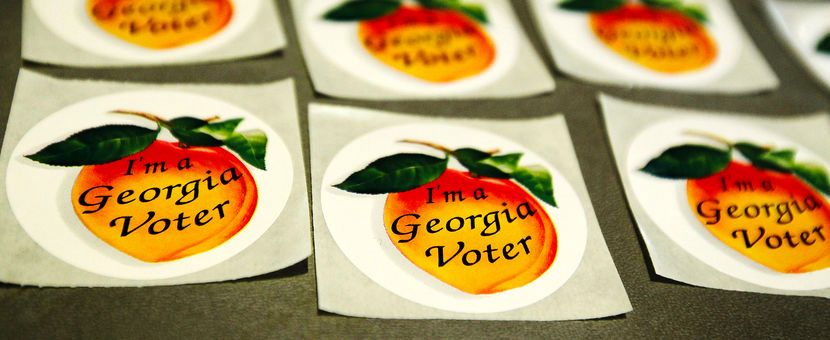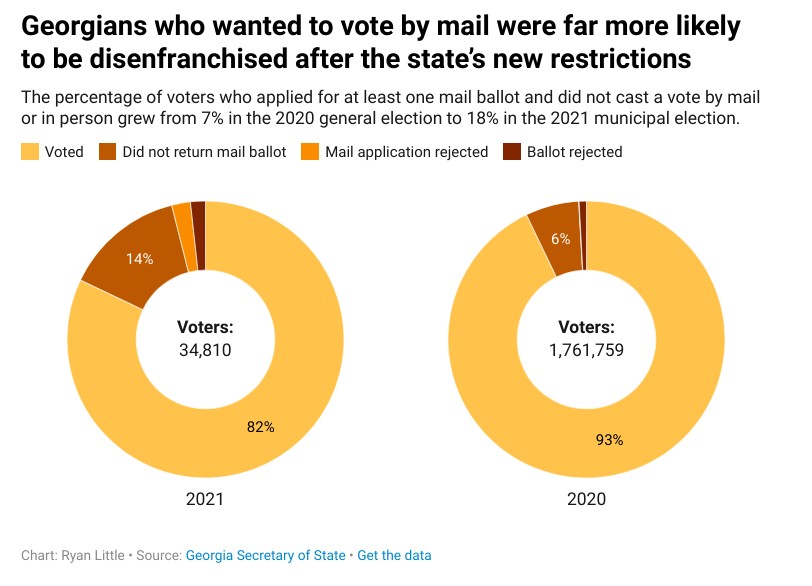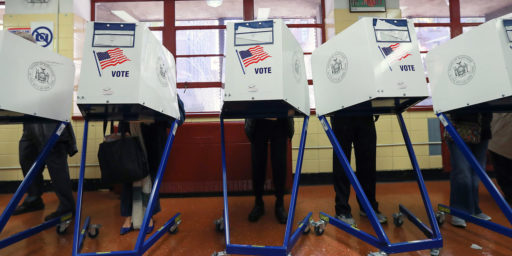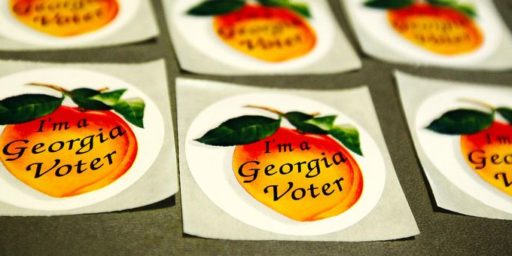Yes, it is Voter Suppression
When procedures lead to more rejected ballots and fewer voters, what else is there to call it?

Mother Jones has a piece analyzing the effects of local elections in November of 2021 under the new voting regulations passed by the state in the wake of the 2020 elections. The results are largely what one might expect: more rejected ballots: We Uncovered How Many Georgians Were Disenfranchised by GOP Voting Restrictions. It’s Staggering.
Let me note two important caveats. First, it is difficult to fully compare a presidential election and local elections. The turnout out is substantially different in scope and character, and so some amount of variation is going to take place. We won’t fully understand the impact of these new rules until 2024 (although this year’s mid-terms, given the races for governor and Senate, will likely see more turnout than usual, so may tell us quite a bit). Second, any legitimate vote lost, regardless of for whom the ballot was cast, is a crime against democratic governance. We need to remember that this is not just about who wins, but the core principle of the process itself. Having said that, it is pretty clear that the attempted suppression is aimed at locations and constituencies that tend to vote heavily for Democrats.
If we look at the outcomes for voters who attempted to vote by mail in 2020 v. 2021, we see some significant differences:

Now, what the reporters in the piece should have done is find the stats for the previous local elections and see what kind of variations were detectable (ideally, several sets of data for those elections). I think this has to be taken into account in terms of assessing these numbers. Likewise, the number of voters is staggering different in terms of scale. This is also a very likely, very real intensity difference between a local election and a presidential one, especially 2020. “Intensity” here meaning how likely people are to vote due to their emotional attachment to the outcome. On the other hand, if someone went out of their way to request a local election ballot, you would think that they would be pretty locked in on voting. All these caveats and qualifiers are of importance and would need to be addressed in a more comprehensive study. At a minimum, the differential 82% voting in 2021 versus 93% in 2020 suggests that the new rules have made voting more difficult and that further study is needed. I would still caution against inferring too much for these data, however.
The piece does note in passing that they did look back:
Mother Jones also compared the 2021 election to municipal elections in 2019 and 2017. We found that mail voters last fall were more than 5 times more likely to be disenfranchised than during those previous elections.
While I would like to see more than this sentence, it does add evidence to the notion that the new rules are having a real effect.
Let’s look at some specific provisions of the new law:
More than half of mail ballot applications were rejected because they arrived after the state’s newly imposed deadline to request them. In 2020, Georgia voters could request a mail ballot up until the Friday before Election Day; under the new law signed by Gov. Brian Kemp in March 2021, voters must place their requests no later than 11 days before the election, which voting rights advocates say is too early and burdensome for many voters.
On the one hand, there has to be a deadline and one can argue about this deadline or that being somewhat arbitrary. And it is also possible that some of the behavior here is the result of a new rule and people not knowing and they will learn in 2022 and 20224 to get the requests in sooner. On the other, unless there is a legitimate technical need (e.g., related to the time needed to process the ballots) there is no good reason to move the deadline back, save to make it harder for people to obtain a ballot.
This is at the heart of so much of these so-called “voter integrity” measures: making the process harder for no discernible reason save the hope that specific kinds of voters are the ones for whom it is harder.
In 2020, more than 21,000 voters requested and cast ballots inside of 11 days before the election. That included Kemp, who went into quarantine because of a Covid exposure on the Friday before Election Day and requested his ballot that same day—something that is no longer allowed because of the law he championed.
These rejections are having a disproportionate impact on Democratic-leaning constituencies. Black voters, who make up about a third of the electorate in Georgia, accounted for half of all late ballot application rejections, according to the voting rights group Fair Fight Action. Voters 18 to 29 made up just 2.76 percent of mail voters in 2021, but they constituted 15 percent of late ballot application rejections. Overall, four times as many Democratic voters requested mail ballots compared to Republicans, so an increase in rejections will particularly harm their party.
So, move the deadline back and hope to stop more Democratic constituencies from voting. And yes, they can still vote in person if their application for vote-by-mail is rejected, but we also know that wait times for voters in these areas are often quite long and, also, that poorer Black voters often have a hard time getting off of work to vote on Election Day.
Of course, in a tight race (like the presidency and two Senate races in 2020 and the governor’s race in 2018) relative handful of votes can make all the difference.
Another provision is the curtailment of drop boxes:
Kemp dropped off his mail ballot on Election Day 2020, but that is no longer allowed. Now drop boxes are available only until the Friday before Election Day, during normal business hours, and must be located inside voting locations, which largely defeats the purpose of having them. The legislature also dramatically cut the number of drop boxes to one per 100,000 active voters in a county, which forced four metro Atlanta counties to reduce the number of drop boxes from 97 in 2020 to 23 in 2021. As a result, the number of voters using drop boxes decreased by half in Cobb, DeKalb, and Fulton counties in November 2021, according to the Atlanta Journal-Constitution, subjecting many more voters to postal delays.
Limiting the number of drop boxes is nothing more than purposefully making voting less convenient. And if voting is less convenient, fewer people will vote. Claims are made about security, but I am unaware of any credible evidence that drop boxes are insecure in any way. Instead, there is a lot of evidence that urban voters are more likely to vote Democratic, and limiting drop boxes in this fashion quite clearly makes voting in cities less easy. The goal here is clearly suppressive in nature. Make it harder for urban voters to vote early so that they are forced to vote on Election Day. But where are the lines likely to be longer? And where are things like traffic and parking and such more likely to make it less possible to take the time off from work to go vote?
(I am quite familiar with both rural Georgia and the Atlanta metro area. Not surprisingly, the former is far easier to navigate even for easy tasks than in the former).
And then there are new voter ID laws for mail-in ballots:
That wasn’t the only reason ballots were rejected. About one-sixth of mail ballots that were thrown out were tossed because voters submitted missing or incorrect identification information after the state had imposed a new ID requirement for such ballots. About 154,000 registered voters do not have an ID on file with the state, with Black voters constituting 58 percent of them.
As I like to note: voter ID is not, in and of itself, a problem. But if we are going to have ID requirement, then we need a free, universal, and easy-to-obtain ID. Until we have such a system, voter ID rules will disproportionally affect poorer, less educated voters and they are generally deployed in a way to simply make voting harder (it is as if there is a pattern here).
I would note, I am unaware of any evidence of significant voter impersonation by mail, raising the question of what problem this provision solves at the cost of voters not being allowed to vote.
I mean, yes, there has been speculation about such fraud, as well as about drop box insecurity. But rank speculation simply should not be a reason to make voting harder.
The test for any voting regulation ought to be whether the security enhancement is worth the cost of potential valid votes. As I have noted on multiple occasions, the evidence for any level of even barely significant voter is basically zero. I have probably written a dozen (maybe dozens) of posts that reference this topic, but I would specifically point to my posts The Reality of Electoral Fraud and A Return to the (Lack of) Evidence of Significant Fraud both of which refer to what is a major source of “evidence” of fraud, the Heritage Foundation’s “database” of electoral fraud as well as an illustration of poor argumentation from the “integrity” crowd. The evidence is scant and the arguments built on it are rickety in the kindest of assessments.
If one looks at these conversations and notes that, well, Democrats just want voting to be easier because they think it benefits them, note that Republicans seem to think that making harder is to their advantage.
The way actions can reveal preferences can be telling. And it is especially telling on the Republicans.
If we value democracy, we should want access to voting to be open and free. This is foundational to the system.
Setting aside any partisan consideration and whatever moral judgments one might wish to attach to them, I will conclude by simply pointing out that making it harder for people to vote with no evidence that those restrictions improve the quality of the outcome, should not be engaged in. They are antithetical to the very spirit of representative democracy, which assumes that the goal of voting is to capture public preferences in an orderly way that would translate into, as some Republican once said, government of, by, and for the people.






Any law that prevents a valid voter from voting is a bad law.
Any law that enables valid voters to vote is a good law.
We are a democratic republic. Voting is a civic good.
We are learning the “If” in that statement is a big “IF.”
We are learning the “we” in that statement isn’t every American who loudly claims to be proud of living in this democratic country.
Over at Digby Tom Sullivan has a piece on vote suppression and education. He quotes Ron Brownstein, “Voting laws are intended to reconfigure the composition of today’s electorate; the teaching bans aim to shape the attitudes of tomorrow’s.” He sees them as complimentary short and long term plans. I don’t entirely agree. I see the education stuff as mostly an effort to fire up the base and drive local organizing today. After all, banning the imaginary teaching of CRT isn’t going to make any real difference. But I did like Sullivan’s formulation of our political division,
@Scott F.:
This is a serious concern. There is a combination of people who really don’t believe in democracy and/or who don’t understand what it means.
@Steven L. Taylor:
And a sizable cohort who don’t believe in democracy who are playing those who don’t understand for fools.
As usual, partisan political discussion often obscure the fundamental question:
Is it Constitutional for the dominant political party of a State to target the preferences of the voters of the “out” party in order to reduce their numbers at the polls or in the final count?
Apparently–it IS constitutional and therefore the opposition to the practice must be couched in reference to something that isn’t Constitutional and that is race-based targeting.
Look–its clear that republicans have found an abstract way of targeting minorities of the Democratic base that passes legal muster. Kudos for them. Don’t forget though, there are ALOT of republican voters in Democrat run states. They should marginalize the fuck out of those voters–and subsequently offer Republicans a truce to de-escalate with the bullshit. You leave D voters alone and we’ll leave R voters alone.
Its sad–but Republicans are simply not good faith actors. They’re not loyal opposition (the ones in charge anyway). They’re respect for anyone or anything is directly proportional to that person’s ability to threaten them. They hate Trump—but Trump’s a threat so they leave him alone. A lone White Supremacist acts on their mental illness–occasionally—but the majority of them are just out talking (we can include insurrectionist Trumpers in this too). Why? Because they understand that likelihood that they are going to get themselves eff’d up. Wayyy easier (and safer) to talk than to risk getting eff’d up. That’s what this type of mentality respects–power.
That’s the pre-requiste for negotiation. If they don’t feel they could be on the receiving end of whatever it is they are putting out–they have no qualms squashing you.
I don’t want to hear another story about the black nonagenarian without a ID or birth certificate. First of all those are civil-rights era people–they been voting for 50 years–they got ID. The one that woke up in 2022 and decided to be a first time voter–well bless em—but they ain’t swinging an election.
Lets just call the spade what it is–take a hostage and negotiate a follow-on hostage swap.
For you it’s about the core principle; for the people enacting and enforcing the laws it’s entirely about who wins. But I suspect you already realize that and are trying to take the higher road.
@Jim Brown 32: I think that kind of hardball will lead to extremely negative outcomes.
The hardball I would have preferred would have been things like DC and PR statehood and expanding the court, etc.
Once you start playing the hostage game with democracy, then all you are saying is that democracy doesn’t matter to you either and we would then further spiral from there.
@Just nutha ignint cracker:
Indeed.
@Scott F.: Yup.
@Steven L. Taylor: We are already in the spiral. One of the parties is simply no longer vested in the process. They don’t want to sede ground on anything that doesn’t bring credit to their party or feed the party narrative.
Whether one cares about democracy (demonstrated through behavior and choices) are questions to be asked in a DIFFERENT part of the spectrum of conflict. Im partial to Glasl’s model– competing in a way that considers broader ideals is a Level 1 play where there is still investment in “win-win” for both parties. In Level 2 (where I believe we are) one or more of the competitors has decided they must Win and the other MUST lose at almost any cost. In the final level–one or more of the competitors decides the other must lose–even if they themselves will lose in the process.
You and I both know that, admitting PR and DC, or expanding the Court would be met with white hot vitriol across the Republican Media Complex–further poisoning non-Democrats. Because Republicans are in Level 2 posture: They MUST win AND Democrats MUST lose. Meanwhile–rational people are still thinking in Level 1 terms for win-wins–terms which are currently unacceptable to Republicans.
@Jim Brown 32: I am just going to reiterate that if we go fully down a path wherein everyone is willing to tear down democratic governance, there will be no turning back.
@Jim Brown 32:
They are literally killing themselves to own the libs. They are encouraging their base to spread disease. They are undermining democracy in a way that will destroy anyone’s ability to govern with the broad if grudging consent of the governed that comes from accepting a loss.
I’ve never heard of Glasl, but here’s the Wikipedia bit for Stage 6 in Level 2:
That was way back in the Obama administration when they were threatening to blow up the world economy with the debt ceiling games. That was the end of Level 2.
Here are the parts of Level 3
I’m not sure why you think they aren’t there. We’re easily into stage 7, with rhetoric of stage 8.
@Steven L. Taylor:
I fear that we have crossed the point of no turning back already. I hope that we have not.
@Jim Brown 32:
Otherwise known as the race to the bottom; destroy democracy in order to save democracy.
@Steven L. Taylor: Indeed. If we’re at “we had to destroy
the villagedemocracy to save it,” we’ve already lost.I live in Pierce County WA. I do not trust anything through the regular mail with the horrible mail theft around here. But I do trust our 40+ armored ballot boxes. The county is roughly 800K, so a location per 20K. I just cannot understand why Austin TX only has one drop box. But going back 20 years, WA voting rolls were awful. in 2004 the votes from two assisted living memory care facilities were enough to decide the governors election. We got lots of room for improvement.
@Bob@Youngstown: @Steven L. Taylor: Yes, it depressing. But you have to be clear eyed about the path back to a semblance of working democracy. I would add Dr Taylor, “ Why aren’t Republican legislatures making the same escalation calculation you make about points of no return when it comes to Democrat voters? Apparently for them, it wasn’t a slippery slope to disenfranchise Democrats.
Imagine this, Pelosi and Schumer walk into McConnells office with McCarty. Pelosi says, “name your terms for a truce”. “We’ll get CNN and MSNBC to moderate their slant to portray Republican causes in a better light and we’d like the same of Fox”. “Lets go back to the days of true loyal opposition regrardless of who has the gavel.
What exactly does McConnell say? What exactly is Republicans beef? I believe McConnell doesn’t tell them anything because there is no real beef other than if Democrats are ever in charge. How do you negotiate with an opponent you can’t even surrender too?
@Jim Brown 32:
This strikes me as not how any of this works. This isn’t how the actors in question view this situation nor do they have the kind of influence you are suggesting.
Moreover, McConnell has been successful at getting what he wants: tax cuts, blocking most legislation, and the confirmation of Justices (and other judges). He gets most of that because of the structure of the Senate (and because of the EC), not because of how blue state Republicans might or might not be treated, nor what is said on CNN or MSNBC.
Indeed, Dems could go on a full-out attack on blue state Reps and it wouldn’t change McC’s calculation one bit.
To be clearer: McConnell got his SCOTUS dreams fulfilled because the Senate over-represents red states and because the EC gave the loser of the popular the presidency.
His current ability to block legislation is, again, about the structure of the Senate.